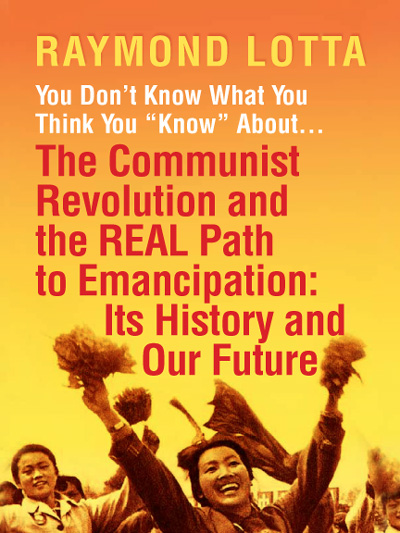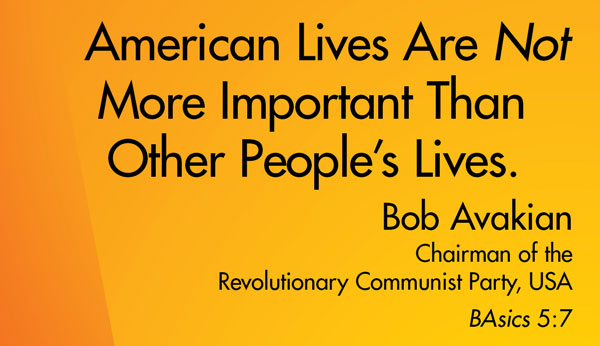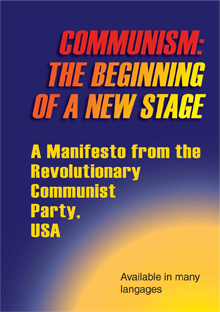Missing from the “Debate” over Iran: the Interests of Humanity!
by Alan Goodman | Updated March 30, 2015; originally published March 16, 2015 | Revolution Newspaper | revcom.us
Editors’ Note: The following article appeared online at revcom.us on March 16, 2015. Since that time, developments in the Middle East—Yemen and elsewhere—have continued to roil and unfold, and the basic orientation and themes in this article continue to be highly relevant.
Due to a production error, a section of this article was left out in the print version that appears in Revolution #379-380, dated April 5, 2015.
As portrayed by much of the mainstream (that is, the ruling class’s) media, the intense dispute between Obama and the Republicans—and between Obama and Israel—over Iran, is about whether to conclude an agreement with Iran’s rulers to restrict their nuclear program. Or—as argued by the most rabid advocates for imperialist aggression: that approach is “too soft.”
In that light, many people—including people genuinely opposed to crimes carried out by the U.S. and its enforcer, Israel—are finding their way to get behind Obama and the position he represents, in conflict with Israel’s genocidal Prime Minister Netanyahu and the Republicans.
There’s one basic problem with that framework and that position: It utterly leaves out and goes completely against the interests and best aspirations of hundreds of millions of people from North Africa to Central Asia.
The people in this region are trapped in a cauldron of reactionary wars and brutal oppression defined by the clash of reactionary forces—Western imperialists who brand themselves "democracies," and reactionary Islamic fundamentalists offer "alternative" forms of exploitation and oppression. The masses of people in this region have been demonized and dehumanized by the Western media. But the hundreds of millions of people in this region are our people. Their interests—and those of the people of the world—lie in ending all oppression. There is a basis for that in the world today, and there is a way out. It is a torturous journey, but it's a real alternative to the hell people are living in—as real as real gets.
* * *
Some of my most vivid impressions from Cairo, Egypt, when I was on the Gaza Freedom March in 2008, are of encounters with Egyptian activists. I was repeatedly and profoundly moved by their courage—risking their lives to assist our international brigade in an attempt to physically defy and break Israel and Egypt’s genocidal blockade of the Palestinian people in Gaza.
You have to understand: as much as there are no real rights in the U.S. that the oppressor is bound to respect, in Egypt under the U.S. partner-in-crime Hosni Mubarak (and today!) the regime doesn’t even pretend there is a right to protest. People got (and get) “disappeared” for simply discussing a street protest in social media—thrown into the regime’s torture-chamber dungeons or tossed in the back of an unmarked police car, driven out into the desert and dumped there, with the expectation of a horrible death in the desert heat.
It wasn’t that Egyptian activists I met were unconcerned about these risks. But over and over I was struck by how deeply the sentiment was embedded that yes, the regime and its backer the U.S. torture and kill people with impunity, but fuck them.
And it’s this defiant sentiment that’s erupted repeatedly, heroically, in that part of the world, where the rule of Western imperialism and local subordinates and partners-in-crime often, if not almost always, takes the most naked form.
Do we get that?
Do we measure the stands we take right now—as the ruling class forces represented by Obama argue that their path represents the best way to advance “our” national interests—by the standard of how long and hard people in the Middle East have fought for freedom?
* * *
Obama, the ruling class forces he represents, and European powers decry that the Middle East is coming apart. There is tremendous and intensifying misery in the region, but what are the roots of that? To put it in basic terms: What is the problem? And what are the interests and aspirations of the people?
In the aftermath of World War 1, Britain and France carved up the region, drawing borders right through the lands of different peoples and greatly exacerbating or creating conflicts that continue to this day. To them, the region was a critical source of oil and a key link in global exploitation and domination. In the period after World War 2, victorious Western powers—this time with the United States at the top of the heap—colluded (even as they feuded) to re-divide the region, to expel the Palestinians from their land through Zionist ethnic cleansing, to lock down control of oil, and maneuver to block advances of the world communist revolution.
But for all their machinations and all their violence, the imperialists haven’t known a moment’s peace.
From 1954-1962, the people of Algeria fought a war of liberation led by secular nationalists against the French imperialists who—according to the French historian Pierre Emmanuel Vidal-Naquet—carried out “possibly hundreds of thousands of instances of torture” to try to crush that uprising. In Iran, after the CIA and British operatives orchestrated the overthrow of an elected nationalist government in 1953, there was unceasing struggle that was viciously repressed by the forces of the imperialist operative, the Shah of Iran. Through waves of repression and resistance—on one day alone more than 10 million Iranians took to the streets—the hated Shah was forced to flee in 1979.
In Palestine, as part of, and supported by the world revolution of the 1960s (with Mao Zedong and the People’s Republic of China providing particularly valuable support), armed forces led by the Palestine Liberation Organization fought tenacious battles with Israel—in 1968 Palestinian fighters held off a major Israeli attack at Karameh, Jordan. The PLO’s program for a liberated, democratic, secular (non-religious) Palestine attracted widespread support around the world, including from a not-insignificant number of Jewish people.
After the PLO was crushed and co-opted, waves of resistance—intifadas—have erupted repeatedly in Palestine. And Arab Spring uprisings in Egypt, Tunisia, Bahrain, and other places in 2011 shook the foundations of the exploitative and oppressive regional order.
That none of these struggles shattered the chains of imperialist domination, exploitation, and oppression is not due to lack of desire, courage, or aspirations for freedom. In some cases, people ran up against the limitations of nationalist leadership, which, even in its most radical expressions, is not capable of uprooting all oppression or breaking the chains of global imperialism.
In Iran in 1979, there were communist revolutionaries who were guided by a vision of ending all oppression—including the oppression of minority nationalities and women—but at the time they were not sufficiently strong to prevent reactionary Islamic fundamentalist clerics from essentially hijacking the revolution and betraying people’s deepest aspirations. In the face of the Islamic Republic’s massacres and torture dungeons, a genuine revolutionary party has been forged, the Communist Party of Iran (Marxist-Leninist-Maoist).
That is just a small part of the story of resistance and rebellion in that part of the world. People never stopped struggling against oppression. But what they lacked, or what they have lacked in sufficient strength, was a leadership that had a vision and strategy to unite all positive factors and really break through to bring forward societies that liberate people, with the aim of a world without oppression of any kind. Leadership like that represents the interests of the most oppressed and exploited people in society, those who, as a class of people, have no stake in any oppression. Such a force can bring forward and give full play to positive factors for revolution in a way no other can, including very importantly unleashing the fury of women as a mighty force for revolution. Such a force can unite very broadly, while continually focusing the struggle against the enforcers of exploitation and oppression.

NEW—eBook from Insight Press, available at Amazon.com and other retailers. Order information at Insight-Press.com.
A Unique Resource:
- Expanded and extensively footnoted revcom.us interview with Raymond Lotta
- Essays on “how do we know the truth?”
- Illustrated Timeline: The REAL History of Communist Revolution
There are positive models of this kind of real revolution happening in modern history. Much as they have been maligned, distorted, lied about, and ruled “off the agenda,” the communist revolutions in what became the Soviet Union (from 1917 to 1956) and the People’s Republic of China (from 1949 to 1976) did succeed in smashing the chains of capitalist exploitation and took great steps to begin overcoming the oppression of women, of minorities, and moving towards a world without class divisions. Although those revolutions were ultimately reversed, they debunked the lie that capitalism-imperialism is the best humanity can do. They demonstrated the potential latent in the billions of oppressed people this system treats as less than garbage, to emancipate humanity and transform the world, and how communist leadership is decisive to unleashing this and throughout the entire revolutionary process. (See “You Don't Know What You Think You ‘Know’ About... The Communist Revolution and the REAL Path to Emancipation: Its History and Our Future.”
Building that kind of leadership, and promoting it where it exists, is not a diversion from the struggle for liberation, it is essential if that struggle is to break out of the suffocating confines of the current world, in theory and in reality.
In his February 2011 statement, “EGYPT 2011: MILLIONS HAVE HEROICALLY STOOD UP... THE FUTURE REMAINS TO BE WRITTEN,” Bob Avakian, Chairman of the Revolutionary Communist Party, USA, speaks to the relevance of the 1917 revolution in Russia:
And the most decisive lesson is this: When people in their masses, in their millions, finally break free of the constraints that have kept them from rising up against their oppressors and tormentors, then whether or not their heroic struggle and sacrifice will really lead to a fundamental change, moving toward the abolition of all exploitation and oppression, depends on whether or not there is a leadership, communist leadership, that has the necessary scientific understanding and method, and on that basis can develop the necessary strategic approach and the influence and organized ties among growing numbers of the people, in order to lead the uprising of the people, through all the twists and turns, to the goal of a real, revolutionary transformation of society, in accordance with the fundamental interests of the people.
And speaking of the work to sum up and advance on the basis of, and beyond the first stage of communist revolution, Avakian adds:
In my writings and talks, in Communism: The Beginning of a New Stage, a Manifesto from the Revolutionary Communist Party, USA, and in other major documents of our Party, we have striven to draw as deeply and fully as possible the critical lessons from the historical experience of the communist revolution and the socialist societies it has brought into being—the very real and great achievements, and the serious errors and setbacks—and to learn from the broader experience of human society and its historical development, in order to contribute all we can to the advance of the revolutionary struggle and the emancipation of oppressed people throughout the world.
This movement for all-the-way liberation, for communist revolution, is not a pipe dream. It is not “someone’s agenda” divorced from the reality of the world and what humanity needs. It is not a “nice idea” that will have to wait for some day in the infinite future, while in the meantime we limit our activism, our agenda, and, yes, our dreams to come instead under the wing of a supposed “lesser evil” in clashes between the U.S., the European powers, Russia, China, ISIS, Israel, Iran, or any of the other oppressive forces operating in the Middle East.
Yes, it will take tortuous struggle to bring forward a movement for communist revolution, and for that movement to lead to breakthroughs in the world revolution—the seizure of power in first some parts of the world. But tortuous struggle is nothing new for the oppressed—in the Middle East or elsewhere.
So absolutely—we have to call out, expose, oppose, and protest the most rabid advocates for more overt U.S. bullying, terror, “boots on the ground” invasions and torture! But we would betray and turn our backs on the people of that part of the world, and the world in general—who have struggled so hard and sacrificed so much—if we align in any way with Obama and the forces he represents as they move to contain the Islamic Republic of Iran, and enlist that brutal regime in helping enforce the U.S.-dominated regional order.
There is nothing good about the Iranian regime, either, as it pursues its own reactionary interests in all this. Nor should or need we have any patience for apologies for the crimes of the Islamic fundamentalists in the region.
What I am arguing for is not “unrealistic.” What is unrealistic is expecting anything positive to come from any of these forces, or having or promoting illusions about them. None of them have any answers for the poverty, the repression, the oppression of women, or any of the other horrors imperialism has bestowed on the Middle East except more violent repression and war.
But the revolution does have answers.
And from that perspective, we can and need to oppose all these forces of oppression, and all their machinations, threats and invasions, sanctions and negotiations. And in doing so, help prepare the ground for people everywhere to get organized for actual revolutions to uproot all oppression.
THAT is real.
Volunteers Needed... for revcom.us and Revolution
If you like this article, subscribe, donate to and sustain Revolution newspaper.


